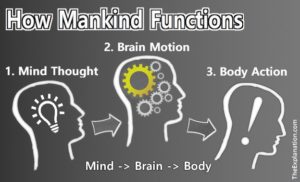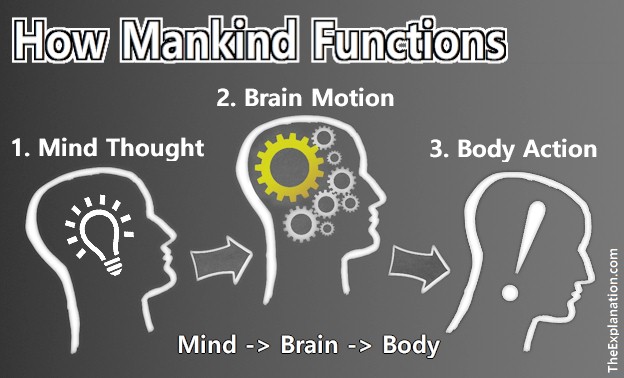Contents
Which comes first: thoughts or brain activity? Concentrating, focusing, and meditating modify our neuron pathways.

How Man Function: The mind has thoughts, the brain receives/transmits, and then the body acts.
With our thoughts we concentrate, focus, and meditate, picturing that each of us has a leg affected by a muscle spasm or another condition. Concentrate on moving those legs from the thigh to the big toe and thus restructure the pain areas in the brain.
(chapter9.10.1)
Painful sensations fade, and the legs move with greater ease without needle aspiration or other medical treatment. In a similar experiment, imagine that you have pain in your forearms. Now focus on some imaginary diverting task, such as listing as many world cities as you can name in alphabetical order.
The pain in the muscles lessens. Mind over matter. Psychosomatic problems can have the reverse effect. Imagine that someone has cut us off in traffic repeatedly, for example, and we develop a stomachache. Our thoughts affect our brain maps, which send signals to our bodies as an indicator of stress.
Fortunately, there are numerous examples that show our thoughts can change the brain in positive ways. For example, let’s take our piano player, who is performing an activity involving concentration. This musician coaches half our group in physically playing the piano.
We know that the supervised activity of playing the piano improves the brain by improving, strengthening, and creating new neuronal connections in our brain “web.” The other half of our group simply imagines touching the keys and learning to pick out “Twinkle, Twinkle, Little Star” or “Für Elise.”
What we may not realize until we examine scans of the brain maps is that the mental practice of the second group produces similar brain map changes to those of the first group which is the one actually playing the piano. In sports training, gymnasts who are shown videos of proper form and technique for cartwheels and backflips are then asked to “play” the videos in their minds.
Once in the training area, the athletes who have visualized performing a handstand have modified their brain maps through imagining and can reproduce the same kinesthetic movements in an actual performance.
We move from athletic and musical prowess to the attention-commanding examples of people with paralyzed limbs who are able to reach out and touch loved ones. Formerly needing assistance for everything, these people are now able to manipulate robotic arms solely with their thoughts such as “I want to touch your hand.”
The robotic arms move exactly 300 milliseconds after the thought occurs. Other thoughts such as “Write a letter,” “Touch the controls on the MRI machine,” or “Pat someone on the head” produce the actions at quick speed. The electrical interfaces of the robotic arms, although impressive, pale in comparison to the idea that our actions are propelled by the speed of imagination, otherwise known as the speed of thought.
Your mind connects with your body. Your thoughts connect with your actions. Your mental prowess propels the hardware.
Your mind connects with your body. Your thoughts connect with your actions. Your mental prowess propels the hardware. Click To TweetEverything we imagine in this room leaves a signature in our brains. Each thought “writes” to the brain synapses and even “edits” them.
Each thought “writes” to the brain synapses and even “edits” them. Click To TweetIf we imagine making a presentation, moving our fingers across a computer, playing on a piano keyboard, or driving, we alter the axons and dendrites in our plastic, malleable brains.
“It’s only a thought,” we say. “It’s just an idea.” Yet everything we’ve been thinking about since we began this trip, even imagining the Big Bang, creates a physical mark in our brain, as though “Big Bang” is written on our neurons. The mind can change the brain. Sustained thoughts (meditation, for example) can alter the neurons firing.
The mind can change the brain. Sustained thoughts (meditation, for example) alters the neurons firing. Click To TweetWe don’t understand why this is so, but perhaps someday those thoughts and imaginings may be explained in physical, concrete terms. Could we one day “see” thoughts (we’re hungry, we’re thinking about home, we’re in love) in our tangle of “computer wire” neurons as those neurons fire? In any case, it’s clear that thoughts do change our brains.
This post is an excerpt from chapter 9.10.1 of Inventory of the Universe.
Since you read all the way to here… you liked it. Please use the Social Network links to share The Explanation with your friends.
The Explanation Blog Bonus
Here is an amazing video of what technology has accomplished using mankind’s functioning process following the steps: mind > brain > rest of the body. Or put another way: thinking > processing > accomplishment. In the video, you’ll see a monkey actually following this process to eat. So, yes, animals can do it but at a very, very limited level.
Only man functions this way at a level that is so far superior with approximately the same sized brain … Consider what Jan Sherman accomplishes and realize that the mankind species has something extra special.
Dig Deeper into The Explanation
Join The Explanation Newsletter to stay informed of updates. and future events. No obligations, total privacy, unsubscribe anytime, if you want.
Online Study Courses to Unlock Bible meaning via Biblical Hebrew… with no fuss. Free video courses that put you in the driver’s seat to navigate the Bible as never before. Join now
The Explanation series of seven books. Free to read online or purchase these valuable commentaries on Genesis 1-3 from your favorite book outlet. E-book and paperback formats are available. Use this link to see the details of each book and buy from your favorite store.
Since you read all the way to here… you liked it. Please use the Social Network links just below to share this information from The Explanation, Thoughts, Musing & Cogitation Transform Physical Agility


